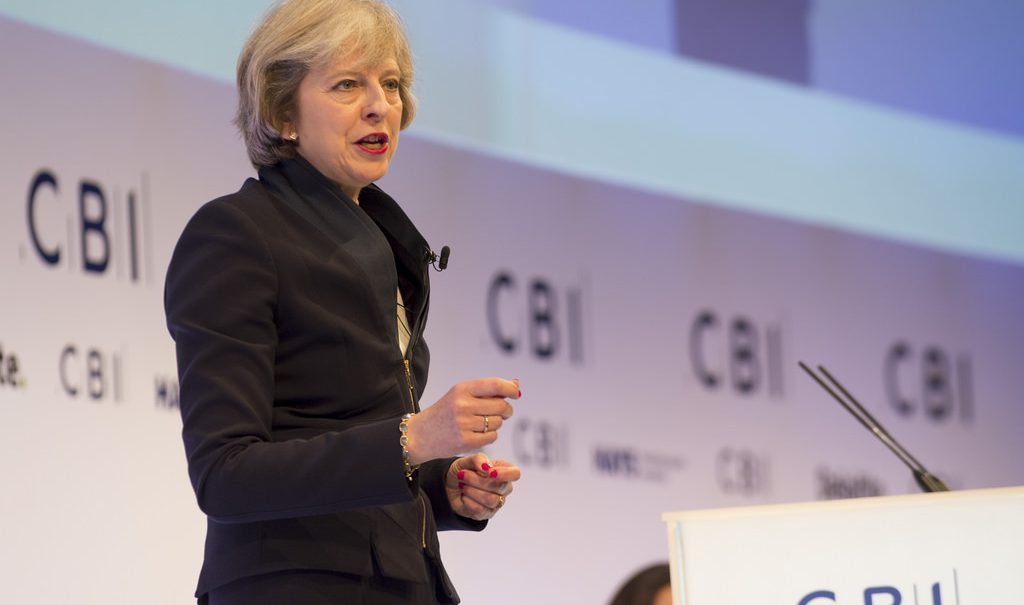Why the Tories do not believe in free markets

Image: Number 10, CC BY-NC-ND 2.0
Theresa May told the Bank of England in a speech in September, ‘A free market economy, operating under the right rules and regulations, is the greatest agent of collective human progress ever created’ and is ‘unquestionably the best, and indeed the only sustainable, means of increasing the living standards of everyone in society.’
In short, the Conservatives claim they believe in free markets, that they have built an economy based on them and that it produces the best results. We cannot say for sure if the last claim has any validity, simply because they have not tried it. Their claims amount to a lie. They have been building the most unfree market system ever conceived.
A free market is one in which firms produce and sell goods and services in competition with one another, and in which government provides a so-called ‘level playing field’ and operates anti-trust rules to prevent monopolies blocking competition. A principle is that capitalist entrepreneurs take risks in making investments, and gain rewards in the form of profits commensurate with those risks. This is not what the Tories have pursued.
Let us start with the international architecture they have helped to build. Thomas Jefferson said in 1813 that ideas could not be made the subject of property. He would be aghast today, since ideas have been converted into the means of blocking market competition. The big change was the passage in 1995 of TRIPS, the Agreement on Trade-Related Aspects of Intellectual Property Rights, as part of the World Trade Organisation.
Led by the USA and backed by the Tory government, TRIPS globalised the capacity of corporations to take production outside the sphere of market competition. The outcome has been dramatic. For instance, in 1995, fewer than one million patent applications were filed internationally. Last year, over 3 million were filed. Each patent guarantees the holder 20 years of monopoly profits from its use; in some sectors, such as pharmaceuticals, it can be longer. Whether or not one approves of this, it is the opposite of a free market. The income linked to patents has risen more than sevenfold since 1995, yet studies have shown that the spread of patents is not correlated with economic growth.
To compound its support for this market-restricting device, the government introduced the wheeze of the Patent Box tax break, meaning that any corporation coming to Britain with patents to produce monopolistic goods, and thus charge monopolistic prices, can receive a subsidy. In other words, firms with monopolistic products gain an extra bonus. This bribe has nothing to do with a free market, and is regressive. The Tories and Liberal Democrats in 2013 also introduced a measure to exempt multinationals from anti-tax avoidance measures, which amounts to another big subsidy.
Similar market-avoiding applies to copyright, which guarantees a monopoly income for someone for their life, plus 70 years or more. No free market there. Similar non-compete restrictions apply to corporate brands and industrial designs. All have multiplied and become more global in scope, cemented by over 3,000 trade and investment pacts that have entrenched monopolistic practices. The Brexiteers want more of those agreements once free of the EU.
All intellectual property rights restrictions limit the scope for free markets, and together account for a huge and growing proportion of income in Britain and elsewhere.
At the apex of the system, the Investor-State Dispute Settlement (ISDS) process gives multinationals unprecedented power, enabling them to sue governments if they introduce any reform that, in the corporation’s view, would hit their future profits. The ISDS is rigged in favour of the corporations, which appoint one of three judges and must approve the third. This reduces the investment risk to well below what would exist in a free market. We as citizens do not have such protection. The government has strongly supported the ISDS.
A derivative lie is that the IP system is designed to reward and encourage innovative risk-taking. But as many patents stem from publicly-funded R & D, it is the public that bears the risk, while the private patent holder reaps the benefits. Many patents are filed just to block competition. All this is as far from being a free market as one could imagine.
The Tories also preside over an edifice of subsidies that give privileges to favoured sectors, firms or individuals. Again, one cannot honestly claim this is consistent with free markets. Among the worst are subsidies given to large-scale land-owners, who are receiving millions of pounds.
The largest private landholder, the delightfully entitled Duke of Buccleuch, possessing 277,000 acres, which he gained by doing nothing (let alone dabbling in anything so grubby as a free market), received £1.6 million in subsidies in one year alone, based on the amount of land he owned, not on what he produced on it. If this is a free market at work, I am a duck.
The Duke of Westminster, reported to be the third richest individual in Britain, with merely 140,000 acres in the country (and 400,000 abroad), has received millions of pounds, simply because he owns land. Testifying to his faith in free markets, the late Duke told a reporter who asked what advice he would give to any budding entrepreneur, ‘Make sure they have an ancestor who was a very close friend of William the Conqueror.’
Excluding the six Dukes in the royal family, the 24 other Dukes own over eight million acres, none gained by free market means, and 17 of those for which information has been obtained receive over £8 million each year and gain a lot more from tax breaks. Surely these welfare payments would act as a disincentive to their working.
When other EU members tried to cap what large landowners could receive, the Tory government vetoed the proposal. That contrasted with what they were doing to state benefits. Ironically, the designer of Universal Credit, through his wife’s inheritance of 1,500 acres, without a free market in sight, has received over $1 million in agricultural subsidies. One crazy aspect of the agricultural subsidies received by the Dukes and their lesser brethren is that most of them are paid only if the land is bare, which has led to an obliteration of trees and wildlife over hundreds of thousands of acres.
Subsidies have been taken to absurd lengths by the fact that the government operates 1,156 forms of selective tax relief. According to Treasury data, the cost of the biggest 200 or so is over £400 billion in foregone revenue, in effect deliberately forgoing revenue that could easily cover the costs of the NHS and state education, and creating a budget deficit that has been used to justify the destructive austerity policy.
That little matter aside, the tax reliefs – for most of which, believe it or not, the Treasury has no estimates of public revenue foregone — automatically distorts market forces in favour of people like landlords, who do particularly well out of tax reliefs. Perhaps it is a coincidence that one in every four Conservative MPs is a landlord.
The housing market epitomises why the Tories do not believe in a free market. Consider their ‘help-to-buy’ subsidies, which have sucked up £10 billion, in spite of not actually helping house buyers. The money has gone into the pockets of developers, who merely put up prices. It sounds good – interest-free loans worth 20% of the property value if the person buys a new house – but has raised the price of new housing relative to old, while wholly benefiting developers. This was the conclusion of Morgan Stanley, hardly a bastion of leftist critics.[i]
Then of course there are the ‘buy-to-let’ subsidies, which have fuelled the growth of landlordism. What principle of free market economics is that meant to serve? The scheme began in 1996, and today about one in every 30 adults is a landlord, mostly amateurish, often letting sub-decent accommodation and relying on interest-only mortgages.
The latter mean that they are very vulnerable to any rise in interest rates. This has apparently distorted monetary policy, Because of fears that raising interest rates would cause a housing crash, the Bank of England has kept rates down to virtually zero, which amounts to a subsidy to the financial community.
Worst of all is the fact that property values have not been revalued since 1991, meaning that council tax is being levied on distorted low values. This amounts to a huge subsidy to house-owners, with more going to the rich with big houses. Now that the Tories have raised the inheritance tax threshold and given tax exemptions for capital gains on homes, they have effectively converted a large part of the property market into a tax haven for sheikhs and oligarchs.
We need to wage a war on subsidies. They are almost invariably regressive, distortionary and economically inefficient. If Theresa May really believed in free markets she would abolish all of them.
Some ad hoc subsidies are just bribes. Among the most egregious is the vast subsidy, which will haunt our children and grand-children with its cost, recently pledged to French and Chinese state enterprises (note, not private) to build a nuclear plant in Somerset. The frighteningly expensive and risky plant, set to cost £30 billion (or some multiple of that), will not be the outcome of a free market economy. In spite of dire warnings from the National Audit Office, May has guaranteed the French and Chinese a unit price that is twice the current and expected price, leaving future generations of taxpayers to be bewildered by the fiscal albatross.
Similarly, the government has promised over £21 million in subsidies to a Japanese firm, Toyota, to help pay for modernising their plant in Derbyshire. This will help them to increase their profits. Nobody should expect them to honour their stated wish to stay and expand. There are 800 Japanese firms in Britain. Expect many to emulate Toyota, and the government to be just as obliging.
Then there are the subsidies given to the privatised monopolies supposed to provide public goods, notably water, sewerage, rail, mail and energy. Those subsidies have continued even when corporations have demonstrably broken the law; Thames Water has been caught pouring millions of litres of untreated sewage into the national river while not fixing leakages and while giving its foreign shareholders over a billion pounds in dividends. Even though Thames Water has been making huge profits and has not paid any corporation tax, the government is giving it further subsidies, bearing the risk of its sewerage mega-project. If Theresa May was really against tax avoidance, surely she would not give subsidies to a firm known to be avoiding tax.
Similarly, the subsidies given to the privatised rail companies have exceeded anything given to British Rail beforehand, without much to show for it. Once again, this is not a free market, whether one likes what is being done or not.
Then there is the subsidy being given to the oil corporations to cut the cost of dismantling rigs in the North Sea. First, the Thatcher government gave them areas for drilling at well below market price; then they were given subsidies to help them make more profits; now they receive subsidies to cut their costs of winding up. This is totally inconsistent with a free market economy. Ironically, successive governments have allowed our national resource to become controlled by state enterprises from a communist superpower. It is not clear that this is a free market principle either.
Then there are the subsidies given via atrocious Public Finance Initiative (PFI) contracts that have locked state schools, hospitals and other public institutions into long-term debt traps, by which they have to keep paying for things that they do not want or that should be cheap. The PFI and the new PF2 are inconsistent with a free market, but are due in part to successive governments wanting to keep spending off their books.
Then there is the subsidy given to private schools. These are profit-making and serve the wealthy. It was revealed in 2017 that some 586 private schools, including Eton, have obtained charitable status and so are entitled to 80% relief on business rates. Eton is no charity. But it gains a nice subsidy from the general taxpayer.
Then there is a subsidy for the rich being phased in by stealth, whereby the Tories have cut inheritance tax by stages, raising the amount before tax becomes payable to £650,000 and now to £1 million, if a house is involved. This is an incredible subsidy to wealthy families, and has nothing to do with free markets. That £1 million received by wealthy offspring is pure unearned income, a huge something-for-nothing, to use a phrase favoured by Tory moralists. Studies have shown that while inheritances of less than £20,000 have no effect on labour supply, anything above £100,000 has a big negative effect. The beneficiaries become parasitic, if they were not so already.
In this, the Tories insult their original patron saint, Adam Smith, who was a passionate advocate for inheritance tax and said, ‘a power to dispose of estates forever is manifestly absurd.’
Then there is the labour market, where government subsidises favoured firms, repeatedly shown to be providing little of value. For example, the government has been giving £158 million a year to Learndirect, the privatised provider of what are meant to be adult training and apprenticeships. The regulator, Ofsted, has found that much of the money has been spent on worthless training and on a Formula One car team. Some 84% of its profits have been given as dividends rather than used as investment, leaving the firm saddled with net debt of £90 million. None of this is compatible with a free market.
And there have been numerous subsidies in the form of tax exemptions on perks given to salaried employees, notably on private pension contributions, childcare and benefits offered on top of salaries. These are regressive, and because of their wide range encourage firms to shift compensation from money wages to non-wage forms of compensation.
Finally, there are those misnamed ‘tax credits’. Over three million people are recipients of tax credits of one form or another. Undoubtedly, they top up low incomes, and thus do reduce poverty. However, they are analogous to the Speenhamland system between 1795 and 1834. They help to depress actual wages.
They are a subsidy to firms paying low wages, since both employer and worker know that whatever the wage it will be topped up. Scandalously, even though successive governments have spent hundreds of billions of pounds on tax credits, and even though independent research has shown that a significant part of that goes to employers, not to low-income workers, there has never been an official evaluation of the impact of tax credits.
Finally, there is the government’s step-by-step extension of personal tax allowances, that is, raising the amount of income a person can earn before it becomes subject to income tax. It is sold as an anti-poverty device, and a boast by Theresa May is that she has taken several million people out of paying any tax at all. That is hardly a worthy objective, if she believes in her own stated mantra that ‘tax is the price we pay for living in a civilised society’. But in any case tax allowances for all are a very ineffectual way to relieve poverty.
If Theresa May really believes what she says, let her set up a Free Market Commission to evaluate all policies on whether or not they are compatible with a free market economy. Ridding the economy of those that are not would surely be consistent with Tory claims. It would free up money enough to fund the crumbling NHS (calling the bluff that the government is not intending to privatise it) and still have enough to fund a modest basic income for every legal resident in the country.
We can be confident that this Tory government has neither the desire nor the energy and competence needed to do any of this. The Labour Party and others, like the Green Party, should promise to do it, and promise a war on the scourge of subsidies as a start.
[i] P.Collinson, ‘Help to buy has mostly helped housebuilders boost profits’, The Guardian, Oct.22, 2017.






